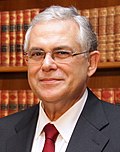Cabinet of Lucas Papademos | |
|---|---|
| Cabinet of Greece | |
 Prime minister Papademos (c.) and party leaders George A. Papandreou (PASOK) (r.), Antonis Samaras (ND) (l.), Giorgos Karatzaferis (LAOS) (fl.) | |
| Date formed | 11 November 2011 |
| Date dissolved | 17 May 2012 |
| People and organisations | |
| Head of state | Karolos Papoulias |
| Head of government | Lucas Papademos |
| Deputy head of government | Theodoros Pangalos Evangelos Venizelos (until 21 March 2012) |
| Member parties | New Democracy, PASOK, LAOS (until 10/02/12) |
| Status in legislature | Ecumenical government |
| Opposition parties | Communist Party of Greece (KKE) Popular Orthodox Rally (LAOS) (from 10/02/12) Coalition of the Radical Left (SYRIZA) Democratic Left (DIMAR) (from 22/03/12) Independent Greeks (ANEL) (from 03/04/12) |
| History | |
| Election | Without election |
| Legislature term | 13th (2009–2012) |
| Predecessor | Cabinet of George Papandreou |
| Successor | Pikrammenos Caretaker Cabinet |
| ||
|---|---|---|
Offices
Prime Minister of Greece | ||
| This article is part of a series on |
| Politics of Greece |
|---|
 |
The Cabinet of Lucas Papademos succeeded the cabinet of George Papandreou, as an interim three-party coalition cabinet, leading a coalition government formed by the Panhellenic Socialist Movement (PASOK) party, New Democracy party and Popular Orthodox Rally party, [1] after Papandreou's decision to step down, and allow a provisional coalition government to form with the task to take Greece out of a major political crisis caused by the country's debt crisis. [2] [3] It was the first coalition cabinet in Greece since the 1989–1990 Ecumenical Cabinet of Xenophon Zolotas.
Contents
The Prime Minister Lucas Papademos and the Cabinet were formally sworn in on 11 November 2011. [4]
